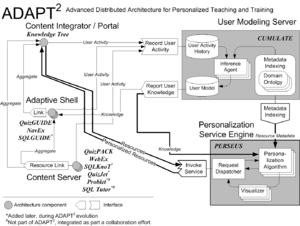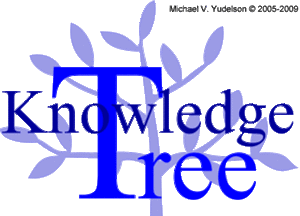Difference between revisions of "ADAPT2"
(→Contacts) |
|||
| Line 7: | Line 7: | ||
* [[Knowledge Tree]] - portal | * [[Knowledge Tree]] - portal | ||
* [[CUMULATE]] - user-modeling server | * [[CUMULATE]] - user-modeling server | ||
| − | |||
* Content Servers | * Content Servers | ||
| + | * Adaptive Shells, AKA Value-added services | ||
* [[PERSEUS]] - personalization service engine | * [[PERSEUS]] - personalization service engine | ||
| Line 18: | Line 18: | ||
== CUMULATE == | == CUMULATE == | ||
| − | [[CUMULATE]] is a | + | [[CUMULATE]] is a central user modeling server responsible for collecting evidence of user activity and for generating *user models* of individual uses, i.e., assertions about user knowledge and mastery. These assertions known as user model could serve([[CUMULATE|more]] on CUMULATE) |
== Adaptive Shells == | == Adaptive Shells == | ||
| − | Adaptive shells aka value-adding services - are providing adaptation and personalization. | + | Adaptive shells aka value-adding services - are providing adaptation and personalization. Adaptive shells stand between a portal and learning objects coming from multiple content servers. In contrast to the portal, which is personalized, adaptive shells provide personalized access to learning objects. serve as wrappers for . Examples of adaptive shells include [[NavEx]], [[QuizGuide]], and [[Knowledge Sea II]]. |
== Content Servers == | == Content Servers == | ||
Revision as of 21:34, 20 January 2025
Contents
Overview
ADAPT2 (read adapt-square) - Advanced Distributed Architecture for Personalized Teaching and Training - is a framework targeted at providing personalization and adaptation services for developers of content that lacks personalization.
ADAPT2 consists of the following principal components.
- Knowledge Tree - portal
- CUMULATE - user-modeling server
- Content Servers
- Adaptive Shells, AKA Value-added services
- PERSEUS - personalization service engine
Knowledge Tree
| Knowledge Tree is a link aggregating portal. It presents content structured according to the folder-document paradigm. Knowledge Tree provides authentication and authorization and implements a simplified form of access control. It supports collaborative authoring and social annotation. (more) |
CUMULATE
CUMULATE is a central user modeling server responsible for collecting evidence of user activity and for generating *user models* of individual uses, i.e., assertions about user knowledge and mastery. These assertions known as user model could serve(more on CUMULATE)
Adaptive Shells
Adaptive shells aka value-adding services - are providing adaptation and personalization. Adaptive shells stand between a portal and learning objects coming from multiple content servers. In contrast to the portal, which is personalized, adaptive shells provide personalized access to learning objects. serve as wrappers for . Examples of adaptive shells include NavEx, QuizGuide, and Knowledge Sea II.
Content Servers
Content servers provide learning objects for students to interact with. Content servers that work with ADAPT2 include: WebEx, QuizPACK, c/jWADEIn, SQLKnoT, QuizJET (PAWS native), SQL Tutor (University of Canterbury, New Zealand) Jeliot (Johensuu University), Problets (Ramapo College, US).
PERSEUS
PERSEUS is a Personalization Service Engine. It provides adaptive support for non-personalized (educational) hypermedia systems by abstracting content presentation/aggregation from user modeling. PERSEUS protocols are based on RDF and RSS 1.0. Although, PERSEUS was initially developed for ADAPT2 framework, its data model permits seamless support of any other hypermedia application. Currently PERSEUS supports social navigation, topic-based navigation, concept-based navigation, and adaptive filtering techniques.
Standardization
Data models of ADAPT2 components are partially serialized as RDF. For more information refer to ADAPT2 RDF Binding.



